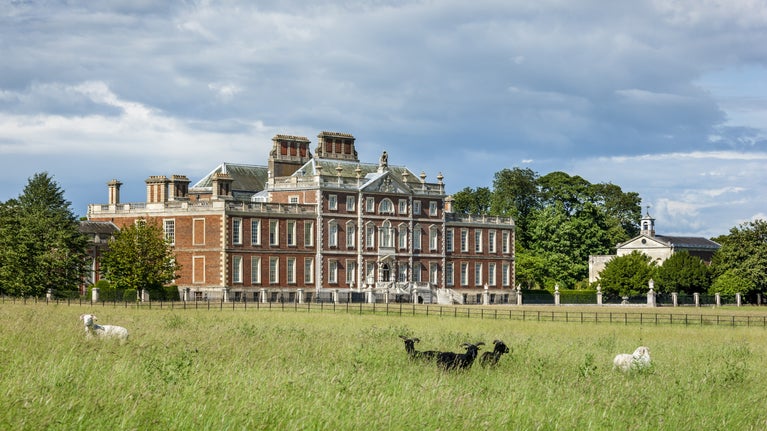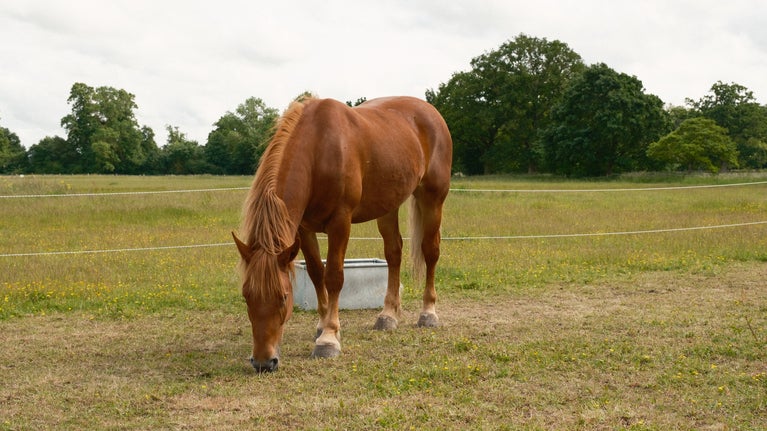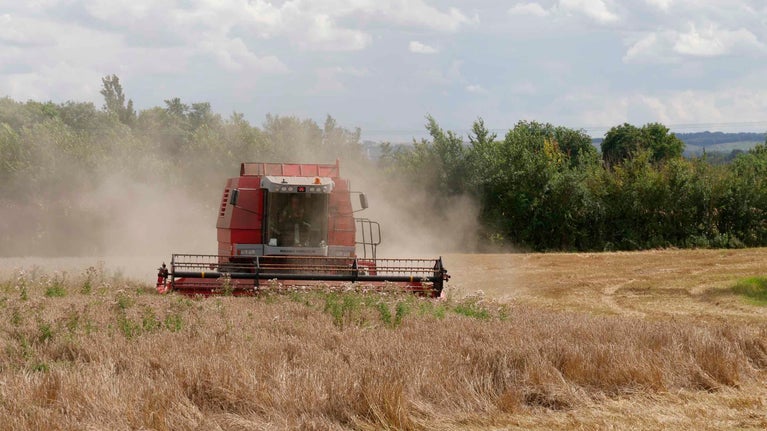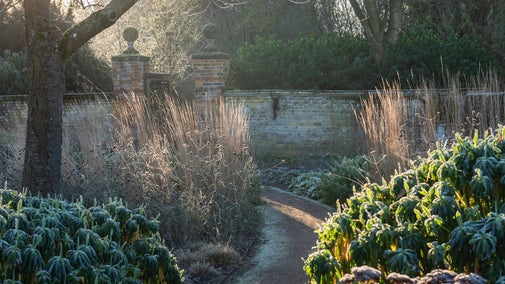
Discover more at Wimpole Estate
Find out when Wimpole Estate is open, how to get here, the things to see and do and more.

Built in 1794, Home Farm is the only in-hand farm of its kind in the National Trust. Unique to Wimpole Estate, it is a model for sustainable farming practices. A must see on your next visit, it is home to many rare-breed animals and the species of flora and fauna that make the estate an agricultural champion.
From fully grown Shire horses to newly born piglets, there’s a wide range of farm animals to meet on your visit. During the spring, lookout for our new 'Springing to Life' event, or in the summer catch our Shire horse experiences to get closer to the farm’s tallest residents.
Make sure you see the whole farm by completing our Home Farm trail and when you’re finished exploring, head to our Farm cafè for a light lunch or take on a new adventure at the farm playground.
As one of the UK’s largest rare-breed centres, the National Trust plays a key role in conserving rare and traditional breeds of livestock. See the Irish Moiled and Shetland cattle in the traditional farmyard, or out grazing in the parkland. There are also Oxford Sandy and Black pigs, small black and white Bagot goats, and rare breeds of sheep out in the park or paddocks.
Each spring, Wimpole’s 280 rare-breed ewes give birth to several hundred new additions to the flock. As lambing season gathers pace, Wimpole’s pens and paddocks are filled with skipping, bleating new life.
Watch the 'Lambing at Wimpole' film
Visit Home Farm during lambing time and you’ll see the lambs start to bond with their mothers. You may see them feeding, sleeping or being cared for by the farm staff as they get them ready to explore the new world around them.
The rare breeds of newborn lambs you may see at Home Farm during lambing time include:
The Shire horse is a rare breed which is categorised as ‘at risk’ on the rare-breed register, which means that there are less than 1,500 breeding females left in the world. Wimpole is working towards keeping this magnificent breed alive, as we promote the work heavy horses can do by showcasing their versatility. The horses are housed together in updated stabling and are used for carriage rides, experience days and ridden work.
There are five Shires at Wimpole: two boys and three girls. Although currently between breeding females, we’ve had a successful breeding programme in the past, showcased through home bred and trained horses, Lady and Jasper.
Our pre-booked carriage rides or Shire driving experience days are the perfect way to celebrate a special occasion or provide a fantastic gift for someone special. Enjoy your own private carriage ride around the estate, pulled by one of our Shire horses, or for the more hands-on approach, join us for an experience day and spend the day working with these magnificent animals.
Visit our events page to book your shire horse experience now.
Did you know that Lady loves having her coat brushed ot that Murphy is a selfie celebrity? Our Shires all have their own personality and here is your chance to get to know them better.
Just £50 covers the cost of a vet call out fee or two horse shoes or four bags of horse feed which lasts a month, essential everyday costs to keep these magnificent horses at Wimpole. All of our horses are available to sponsor; Murphy, Jasper, Lady, Queenie and Joan, which enables you to come and meet your horse in person, have your photograph taken with them and have your special moment with them.
When you donate you receive . . .
A great gift for birthdays or Christmas for friends and family.
For more information about sponsoring our Shire Horses, email our team on the farm.

Our grade 1 parkland and internationally protected woodlands are surrounded by our 750-acre organic arable farm.
Our farm is one of the only organic farms in the area and we are very proud of producing high quality food in a way that supports a wide variety of wildlife. We produce wheat, rye and spelt for organic breads, oats for organic porridge and barley for organic beer.
Our organic farming system includes resting the land between crops for up to 4 years. We use a range of plants which add fertility to our soil rather than artificial fertilisers. These plants also provide a great home for nature as they provide nectar and pollen throughout the spring and summer.
We are able to leave space for nature on our farm thanks to the funding from a Higher-Level Stewardship agreement, where we are paid by the government to provide habitats for wildlife. This include 17 miles of hedges, 70 acres of margins and over 8 acres of crops specifically planted to feed wild birds throughout the winter.
The success of nature-friendly farming, in the field and around the hedges and ditches, means that Wimpole has a productive and sustainable farm that has a variety of rare flora and fauna, and five of the six most threatened farmland birds in the UK.

Find out when Wimpole Estate is open, how to get here, the things to see and do and more.
From events and activities to getting close to animals, here's what you need to know about a family day out at Wimpole.

From Iron Age roundhouses to a modern estate, Wimpole has been lived on and farmed for over 2,000 years. Discover how its owners have each left their mark.

Discover Wimpole’s gardens and visit the Parterre, walk through the Pleasure Grounds meandering your way to the Walled Garden, with herbaceous borders and fruit trees.

Step inside Wimpole Hall and discover how previous owners made their mark on this complex house.

Stop for a bite to eat at one of the cafés or in the Old Rectory Restaurant at Wimpole.

Visit the shop at Wimpole to find produce from the farm, locally sourced treats, toys and plants or bag yourself a bargain in the second-hand bookshop.

Explore the acres of parkland at Wimpole, abundant with wildlife, flora and fauna; stroll across the open space, or head across the Chinese bridge to visit the Gothic folly.
